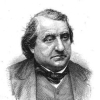Ernest Renan

Ernest Renan
Joseph Ernest Renanwas a French expert of Middle East ancient languages and civilizations, philosopher, historian, and writer, devoted to his native province of Brittany. He is best known for his influential historical works on early Christianity, and his political theories, especially concerning nationalism and national identity. Renan is credited as being among the first scholars to advance the Khazar theory, which held that Ashkenazi Jews were descendants of Turkic peoples who had adopted Jewish religion and migrated to Western Europe...
NationalityFrench
ProfessionHistorian
Date of Birth28 February 1823
CountryFrance
I can die when I wish to: that is my elixir of life.
In morals, truth is but little prized when it is a mere sentiment, and only attains its full value when realized in the world as fact.
Let us remember that sorrow alone is the creator of great things.
Never has any one been less a priest than Jesus, never a greater enemy of forms, which stifle religion under the pretext of protecting it. By this we are all his disciples and his successors; by this he has laid the eternal foundation-stone of true religion; and if religion is essential to humanity, he has by this deserved the Divine rank the world has accorded him.
The epic disappeared along with the age of personal heroism; there can be no epic with artillery.
The man who obeys is nearly always better than the man who commands.
He whom God has touched will always be a being apart: he is, whatever he may do, a stranger among men; he is marked by a sign.
The ignorance of French society gives one a rough sense of the infinite.
Every rebel is, with us, more or less a soldier who has missed his vocation, a being made for a heroic life ... The European race is a race of masters and soldiers. If you reduce this noble race to the work in a slave's prison like Negroes or Chinamen, it will rebel.
A grain of sand leads to the fall of a mountain when the moment has come for the mountain to fall.
A nation is a body of people who have done great things together.
Sometimes they reasoned thus: "The Messiah ought to do such a thing, now Jesus is the Messiah, therefore Jesus has done such a thing." At other times, by an inverse process, it was said: "Such a thing has happened to Jesus; now Jesus is the Messiah; therefore such a thing was to happen to the Messiah."
It is evident, indeed, that such a doctrine, taken by itself in a literal manner, had no future. The world, in continuing to exist, caused it to crumble. One generation of man at the most was the limit of its endurance. The faith of the first Christian generation is intelligible, but the faith of the second generation is no longer so. After the death of John, or of the last survivor, whoever he might be, of the group which had seen the master, the word of Jesus was convicted of falsehood.
Human cruelty took the form of a pact with the deity. A solemn oath was made to kill everything, in which people forbade themselves any display of reason or compassion. A city or a land was devoted to destruction and it was believed an insult to God if one did not observe the abominable oath.